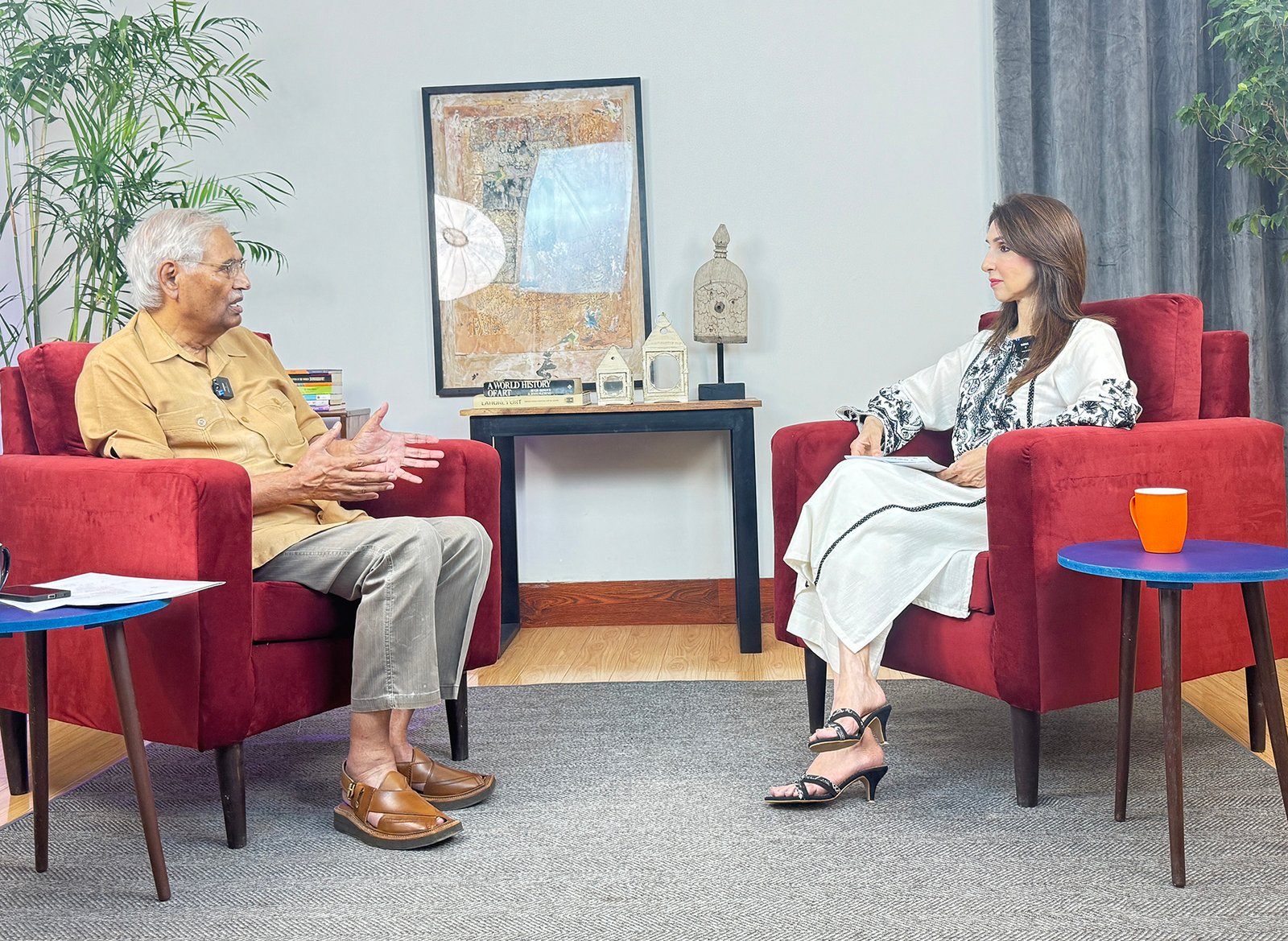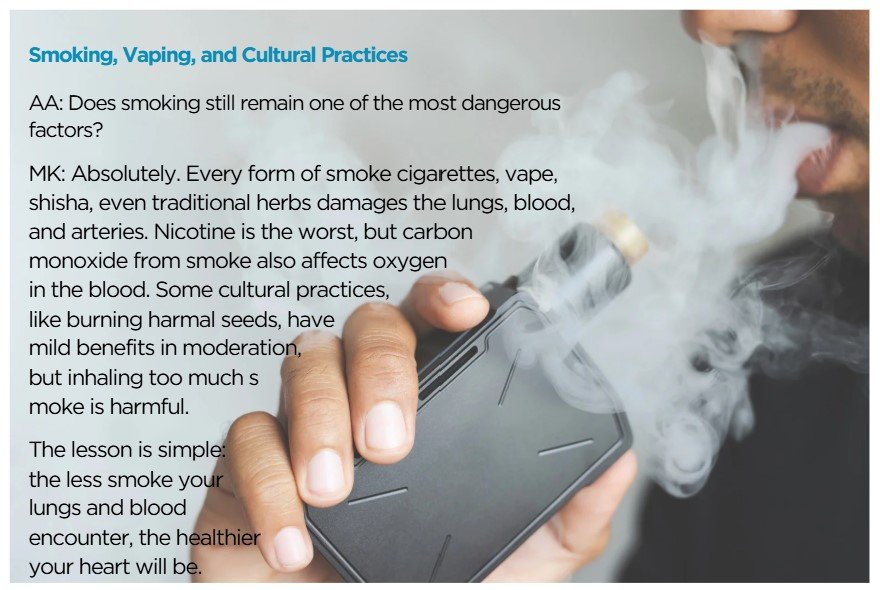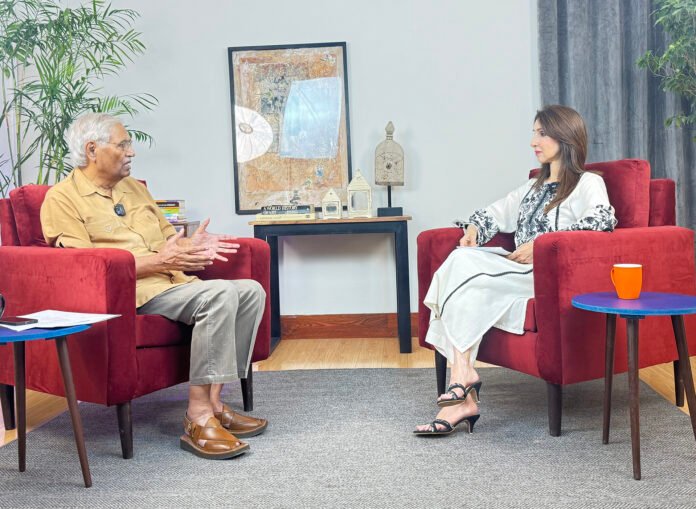Pakistan is at the center of a heart disease crisis. Explore its causes, risks, and prevention with insights from PANA and Maj. Gen. Masud-ur-Rehman Kiani
Heart disease has quietly become the world’s deadliest killer, and nowhere is this more evident than in South Asia. Once considered a disease of the elderly, cardiac conditions now strike people in their 30s and 40s, robbing societies of their most productive members. In Pakistan, the problem is compounded by skyrocketing rates of type 2 diabetes, obesity, and hypertension, conditions that often develop years before the first heart attack.
To understand this crisis, I sat down with Major General Masud-ur-Rehman Kiani, a pioneering cardiac surgeon and President of the Pakistan National Heart Association (PANA). Over the course of our discussion, he traced the history of heart health advocacy in Pakistan, identified the true culprits behind rising cardiovascular disease, and explained how policy, lifestyle, and even laughter can determine the strength of our hearts.

MT Out Loud Podcast
Why Heart Disease Matters
AA: What makes heart disease so devastating compared to other illnesses?
MK: Because it often strikes people in their prime. Imagine someone in their 40s or 50s at the height of their professional career, supporting a family, and contributing to society. When heart disease strikes, all that experience and productivity is lost.
Globally, most deaths today are caused by non-communicable diseases heart disease being the leader, followed by cancers, strokes, kidney failure, and diabetes complications. These conditions don’t spread from person to person like tuberculosis or typhoid; they develop silently through years of poor lifestyle and unchecked risk factors. That’s what makes them so insidious.
South Asia: The Global Capital of Heart Disease
AA: South Asia has become the epicenter of this crisis. Why are we so vulnerable?
MK: There are several reasons. First, genetics. People in the subcontinent are predisposed to early atherosclerosis, hardening of the arteries, which was once considered an old-age disease. Now, we see young men in their 30s having heart attacks.
Second, lifestyle habits. In the West, there has been progress in reducing smoking, promoting exercise, and improving diets. Unfortunately, we imported the worst habits of processed food, sugary drinks, and sedentary routines without adopting their discipline and regulation.
And third, stress and social pressures. Competition, family expectations, and economic strain all create a chronic stress environment, which directly damages the arteries and heart.

The Role of Lifestyle
AA: What is meant by lifestyle?
MK: Lifestyle includes everything: what we eat, when we eat, how much we move, how we manage stress, and even how we connect with others socially. Physical activity has dropped drastically. When I was a boy, I walked kilometers daily to school. Today, children wait for a motorbike or a Suzuki van, even for a short distance. That loss of natural movement has crippled our health.
Diet is another culprit. Our food is drenched in oils, repeated frying creates toxic trans fats, and ultraprocessed supermarket foods are full of preservatives and hidden sugars. Add smoking, whether traditional cigarettes, vaping, or other inhaled substances and you have a perfect recipe for disaster.
Sugar: The Sweet Poison
AA: For decades, we were told fat and salt were the main villains. Now, experts call sugar the “sweet poison.” Why?
MK: Research has made it very clear: sugar is a major driver of obesity, diabetes, and heart disease. The World Health Organization recommends no more than 40–50 grams of sugar per day for adults, about 8–10 teaspoons. But one small juice box or soft drink often contains 6–9 teaspoons of sugar alone.
The real danger is industrial sugar use. In Pakistan, 70–80% of sugar consumption now comes from processed foods and beverages, not from home kitchens.
Sweetened sodas, packaged juices, and bakery items have become routine for children. When I was young, a cold drink was a rare treat. Now, crates of soda are delivered to homes weekly. This shift has fuelled the explosion in diabetes and obesity.
Stress, Social Bonds, and the Heart
AA: Stress seems unavoidable in our lives. Doctors often tell us to “avoid stress,” but is that realistic?
MK: It’s true that life comes with pressures, exams, jobs, finances, and family. Short-term stress is normal; it can even be motivating. The danger lies in chronic, unrelenting stress, which produces chemicals like cortisol and adrenaline that harden arteries and damage the heart.
The antidote is connection and laughter. People with strong social ties, family, friends, and community are healthier and happier. Laughter yoga, group sports, and even sitting with friends for open conversation can reduce stress hormones and improve heart function. Social connection is medicine.
Our food is drenched in oils, repeated frying creates toxic trans fats, and ultraprocessed supermarket foods are full of preservatives and hidden sugars.

Powerful lobbies, what I call the “sugar mafia” and “tobacco mafia,” resist reforms
Policy, Industry, and Resistance
AA: How effective are government regulations in curbing these risks?
MK: Policies can be powerful. Look at Saudi Arabia: they imposed a 100% tax on sugary drinks and energy drinks. Within two years, obesity rates began to decline. Similar taxes on cigarettes have also reduced consumption worldwide.
But in Pakistan, powerful lobbies, what I call the “sugar mafia” and “tobacco mafia,” resist reforms. We fight year after year for higher taxes and better labeling, and while ministries often support us, the final budget often waters down reforms. These industries use misleading statistics and argue that higher taxes will increase smuggling. Stronger political will and enforcement mechanisms are needed.
The Cost of Neglect
AA: What is the economic burden of these diseases on Pakistan?
MK: Enormous. Pakistan recently borrowed $1.3 billion from the IMF, yet spends nearly $2.6 billion annually on managing diabetes alone. The health costs of obesity, heart disease, and diabetes far exceed the tax revenues from sugary drinks and tobacco. Prevention is not just a health priority; it is an economic necessity.

The Role of Civil Society
AA: When regulation is weak, what role can civil society play?
MK: A vital one. We conduct workshops in schools, mosques, churches, and universities. We’ve held awareness sessions as far as Swat, Quetta, and Kashmir. Our campaigns encourage youth to challenge unhealthy habits.
Civil society also has the power to pressure policymakers. We encourage students to make videos, podcasts, and creative campaigns. When young people speak, the message spreads faster. But we need a coordinated, well-funded national movement for prevention, not just scattered efforts.
The health cost: Pakistan recently borrowed $1.3 billion from the IMF, yet spends nearly $2.6 billion annually on managing diabetes alone… Prevention is not just a health priority; it is an economic necessity
Message
MK: Protecting your heart is a responsibility to yourself, your family, and your country. Every cigarette avoided, every sugary drink replaced with water, every daily walk, these small choices add up. Prevention is cheaper and far more powerful than treatment.
If we as a nation prioritize heart health, we save not only lives but also the future of our economy and society.
The Pakistan National Heart Association (PANA) traces its origins to the 1970s, when the Armed Forces Institute of Cardiology was founded as a joint effort of the armed forces, government, and civil society to build a world-class treatment center. By the mid-1980s, as a global surge in heart disease became evident in Pakistan as well, the need for prevention was undeniable. In 1984, PANA was established to move beyond treatment—raising public awareness of risk factors, promoting healthier lifestyles, and advocating national policies that save lives.







